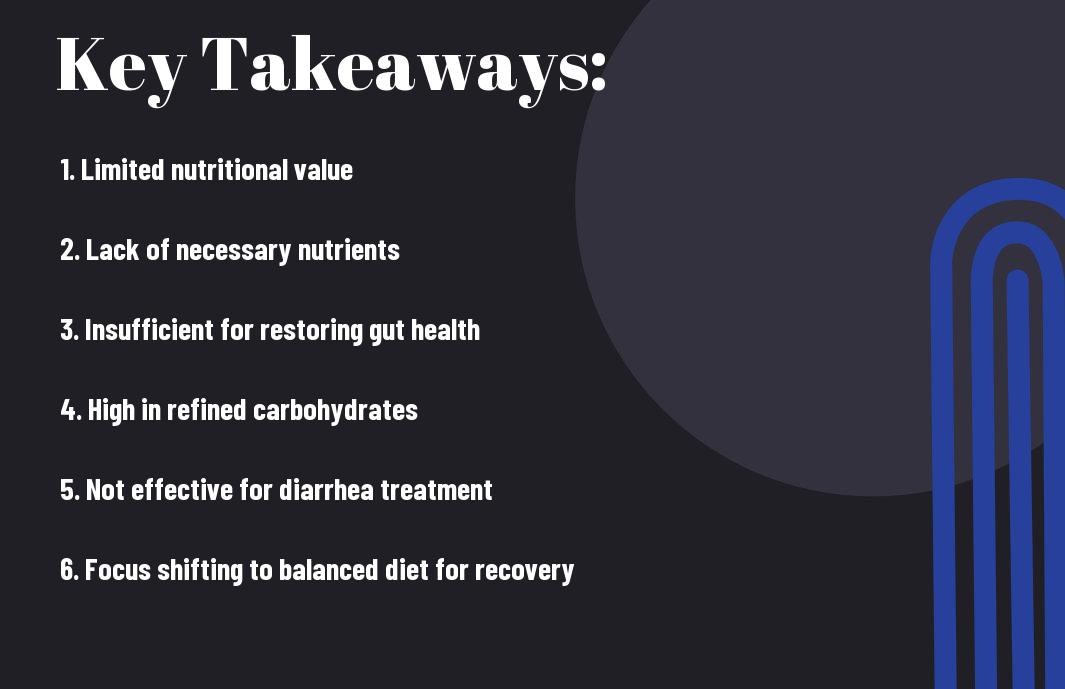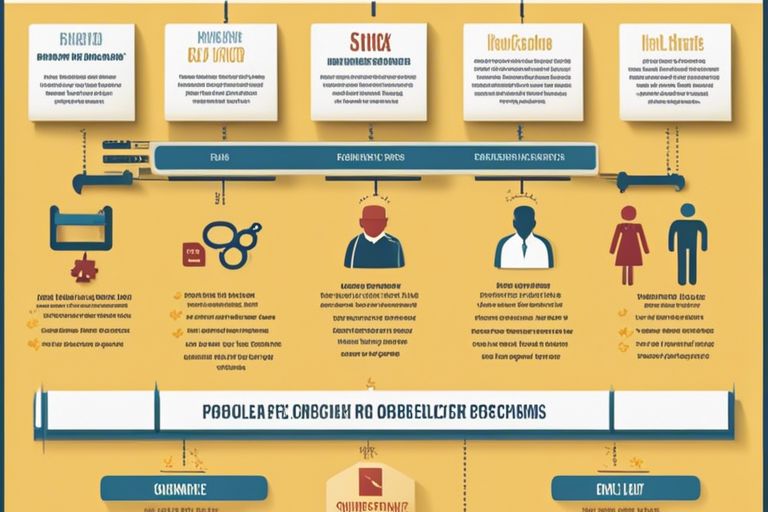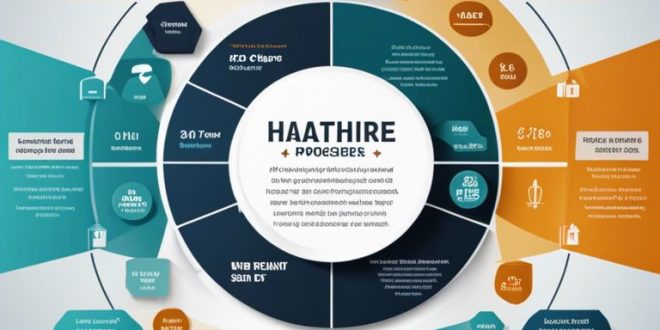You may have grown up hearing about the BRAT diet as a go-to remedy for upset stomachs and gastrointestinal issues. However, recent medical findings have led to a shift in recommendations, with experts now advising against the BRAT diet. This once-popular diet consisted of bananas, rice, applesauce, and toast, believed to be gentle on the stomach during times of illness. While easy to digest, the BRAT diet lacks vital nutrients needed for recovery and may delay the healing process. In this blog post, we will explore the reasons why the BRAT diet is no longer recommended by healthcare professionals and what alternatives are suggested for managing digestive discomfort. Stay informed to make the best choices for your health!
Table of Contents
Key Takeaways:
- Insufficient in nutrients: The BRAT diet lacks crucial nutrients such as proteins, healthy fats, and vitamins necessary for overall health and recovery.
- Not effective for recovery: Due to its limited nature, the BRAT diet may not provide adequate nourishment needed for a person to fully recover from gastrointestinal issues.
- Focus on balanced diet: Healthcare professionals now recommend a more balanced diet that includes a variety of foods to promote healing, maintain energy levels, and support overall well-being.

Understanding the BRAT Diet
The Components of the BRAT Diet
To understand the BRAT diet, we need to break down its components. The diet primarily consists of bananas, rice, applesauce, and toast – hence the acronym BRAT. These foods are bland and low in fiber, which is believed to help ease digestive discomfort during times of illness.
Intended Uses and Rationale
BRAT diet was traditionally recommended for individuals suffering from gastrointestinal issues like diarrhea, nausea, or vomiting. However, in recent years, medical professionals no longer universally advise this diet. The BRAT diet lacks crucial nutrients and may not provide sufficient caloric intake for a speedy recovery.
Generally, the main intention behind the BRAT diet was to give the gut a chance to rest and recover by consuming bland and easily digestible foods. However, it is now understood that a more balanced diet, including fluids to prevent dehydration, is more beneficial for a quicker recovery. This is especially important for children and individuals with certain health conditions who may need more nutrients during illness.

Shifts in Dietary Recommendations
Advancements in Nutritional Science
Advancements in nutritional science have revealed that the traditional BRAT diet (bananas, rice, applesauce, and toast) may not provide the necessary nutrients for individuals recovering from gastrointestinal issues. Research has shown that a more balanced diet with a variety of foods can actually aid in a quicker recovery and improve overall health outcomes.
Changing Views on Gastrointestinal Health
Views on gastrointestinal health have evolved, influencing dietary recommendations. While the BRAT diet was once thought to be the gold standard for easing digestive issues, it is now understood that a restrictive diet may delay recovery and lead to nutrient deficiencies. Instead, the focus has shifted towards maintaining a diverse and nourishing diet to support gut health.
Science now recognizes that a bland diet like the BRAT diet may not provide enough necessary nutrients to support the body’s healing process during a gastrointestinal illness. By incorporating a wider variety of foods, individuals can ensure they are getting the vitamins, minerals, and proteins needed for a faster recovery and overall well-being.
Criticisms and Limitations of the BRAT Diet
After What is the BRAT Diet? Breaking Down its Pros and Cons, it is necessary to discuss the criticisms and limitations of the BRAT diet. While this diet was once a common recommendation for easing digestive distress, modern healthcare professionals have identified several drawbacks that make it less than ideal for a speedy recovery.
Nutritional Deficiencies and Risks
The BRAT diet, which stands for Bananas, Rice, Applesauce, and Toast, lacks necessary nutrients needed for a balanced diet. Relying solely on these bland, starchy foods can lead to deficiencies in protein, healthy fats, vitamins, and minerals. Prolonged adherence to the BRAT diet may increase the risk of malnutrition, especially in children and the elderly.
Lack of Scientific Support
The BRAT diet’s effectiveness in treating diarrhea and stomach upset has come into question due to a lack of scientific evidence supporting its benefits. While these foods are gentle on the stomach and may help firm up stools temporarily, there is no solid proof that they speed up recovery or prevent dehydration. Healthcare professionals now recommend a more balanced and nutrient-rich diet to support healing and overall health.
It is crucial for individuals experiencing gastrointestinal issues to consult a healthcare provider for personalized dietary advice tailored to their specific needs. Emphasizing a diverse range of foods that provide necessary nutrients can promote quicker recovery and prevent potential nutritional deficiencies associated with restrictive diets like the BRAT diet.
Alternative Approaches to Managing Gastrointestinal Distress
Comprehensive Dietary Recommendations
Gastrointestinal distress can be effectively managed through comprehensive dietary recommendations that focus on incorporating a variety of easily digestible foods. Instead of sticking to bland and restrictive diets like the BRAT diet, which may lack important nutrients, a more balanced approach is recommended. This includes incorporating fruits, vegetables, lean proteins, whole grains, and healthy fats to support digestive health and overall well-being.
The Role of Hydration and Probiotics
Hydration plays a crucial role in managing gastrointestinal distress as it helps to keep the digestive system functioning properly and prevent issues like constipation. Probiotics, which are beneficial bacteria that support gut health, can also play a key role in alleviating symptoms like bloating, gas, and diarrhea. Including probiotic-rich foods like yogurt, kefir, sauerkraut, and kimchi in your diet can help restore the balance of good bacteria in the gut and improve digestive function.
In addition to incorporating probiotic-rich foods, it is important to stay well-hydrated by drinking an adequate amount of water throughout the day. Dehydration can exacerbate gastrointestinal issues, so maintaining proper hydration levels is important for supporting optimal digestive function.
To wrap up
Following this information, it is apparent that the BRAT diet is no longer recommended by healthcare professionals due to its limited nutritional content and lack of ability to provide the necessary nutrients for a speedy recovery from gastrointestinal issues. It is crucial to consume a well-balanced and varied diet to ensure proper healing and replenishment of nutrients. Instead of solely relying on the BRAT diet, individuals should focus on incorporating a wide range of easily digestible and nutrient-dense foods to aid in the recovery process. It is recommended to consult a healthcare provider for personalized dietary advice when dealing with stomach or intestinal issues.
FAQ
Q: Why is the BRAT diet no longer recommended?
A: The BRAT diet, which consists of bananas, rice, applesauce, and toast, is no longer recommended because it lacks the necessary nutrients to support the body during illness. It is low in protein, fat, and fiber, which are crucial for overall health and recovery.
Q: What should I eat instead of the BRAT diet when recovering from an illness?
A: Instead of the BRAT diet, it is recommended to consume a balanced diet that includes a variety of foods such as fruits, vegetables, lean proteins, whole grains, and healthy fats. This will provide the body with the nutrients it needs to heal and recover effectively.
Q: Are there any specific food recommendations for gastrointestinal issues?
A: Yes, for gastrointestinal issues, it is recommended to consume easily digestible foods such as plain yogurt, steamed vegetables, bone broth, and lean proteins like chicken or fish. It is also important to stay hydrated with water, herbal teas, or clear broths to support digestion and promote healing.
 hqsportz Personal Website | Tell Information about Sport, Fashion And Health
hqsportz Personal Website | Tell Information about Sport, Fashion And Health



